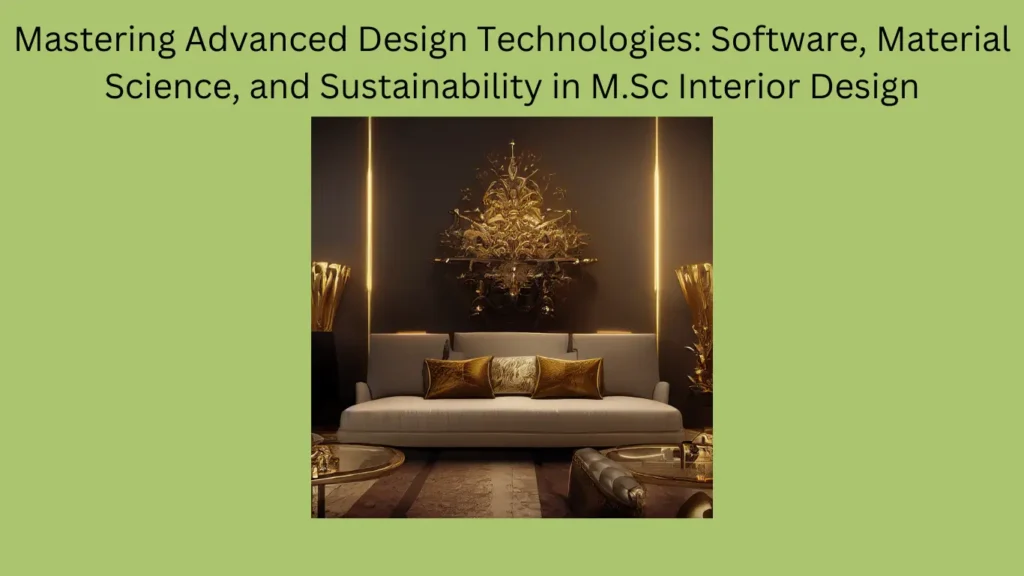Embarking on the M.Sc Interior Design journey is a plunge into the convergence of art and technology. This guide explores how the program’s curriculum, driven by a people-first philosophy, empowers students to master advanced design technologies, including cutting-edge software, material science, and sustainable practices.
The Intersection of Art and Technology
Dynamic Software Integration
M.Sc Interior Design leverages cutting-edge design software, providing students with a hands-on experience in creating digital models, simulations, and immersive virtual spaces. This dynamic integration of technology enables a seamless transition from concept to visualization.
Material Science Exploration
Understanding materials at a molecular level is key to creating innovative designs. The program delves into material science, allowing students to explore the properties and possibilities of a wide range of materials. This knowledge enhances their ability to craft spaces that are not only aesthetically pleasing but also durable and functional.
Sustainable Design Practices
Embracing Eco-Friendly Solutions
In response to the global call for sustainable design, the program places a strong emphasis on eco-friendly solutions. Students explore sustainable materials, energy-efficient designs, and principles that minimize the environmental impact of interior spaces. This commitment aligns with a people-first approach that prioritizes the well-being of both inhabitants and the planet.
Integrating Green Technologies
M.Sc Interior Design goes beyond theoretical discussions by integrating green technologies into the curriculum. Students learn how to incorporate smart systems, renewable energy sources, and other eco-conscious solutions, ensuring that their designs align with the latest advancements in sustainable living.
Nurturing Technological Proficiency
User-Centric Technological Solutions
A people-first philosophy extends to the use of technology. The program emphasizes user-centric technological solutions, ensuring that advanced tools enhance the user experience rather than complicate it. This approach fosters designs that are not only technologically sophisticated but also intuitive and user-friendly.
Industry-Relevant Skill Development
To prepare students for the demands of the industry, the curriculum focuses on developing skills that are highly relevant in the contemporary design landscape. This includes proficiency in the latest design software, staying abreast of technological advancements, and understanding the evolving role of technology in interior design.
Empowering Designers for the Future
Fostering Creativity with Technology
M.Sc Interior Design recognizes that technology is a catalyst for creativity. By providing students with a comprehensive understanding of advanced design technologies, the program empowers them to push the boundaries of innovation and bring their imaginative visions to life.
Human-Centered Technology Integration
In the pursuit of mastering advanced design technologies, the program maintains a human-centered approach. Technology is viewed as a tool to enhance the quality of life, promote well-being, and create spaces that resonate with the needs and desires of the people who inhabit them.
Conclusion: Designing Tomorrow’s Spaces Today
M.Sc Interior Design’s commitment to mastering advanced design technologies reflects a vision of designing tomorrow’s spaces today. By integrating cutting-edge software, material science, and sustainable practices, the program not only equips students with technical proficiency but instills in them a people-first mindset that is essential for creating designs that stand the test of time.
For further Inquires Contact Us
FAQs
1. How does M.Sc Interior Design integrate design software into its curriculum?
- The program integrates cutting-edge design software for hands-on experience in digital modeling, simulations, and virtual space creation.
2. What role does material science play in the M.Sc Interior Design program?
- Material science is a key focus, allowing students to explore material properties and possibilities, enhancing their ability to create durable and functional designs.
3. How does the program emphasize sustainable design practices?
- M.Sc Interior Design places a strong emphasis on sustainable design by exploring eco-friendly solutions, green technologies, and principles that minimize environmental impact.
4. What skills does the program develop to prepare students for the industry?
- The curriculum focuses on developing industry-relevant skills, including proficiency in design software, staying updated on technological advancements, and understanding the evolving role of technology in design.
5. How does M.Sc Interior Design balance technological proficiency with a people-first approach?
- The program ensures a human-centered approach to technology, viewing it as a tool to enhance quality of life, promote well-being, and create spaces aligned with the needs of inhabitants.

